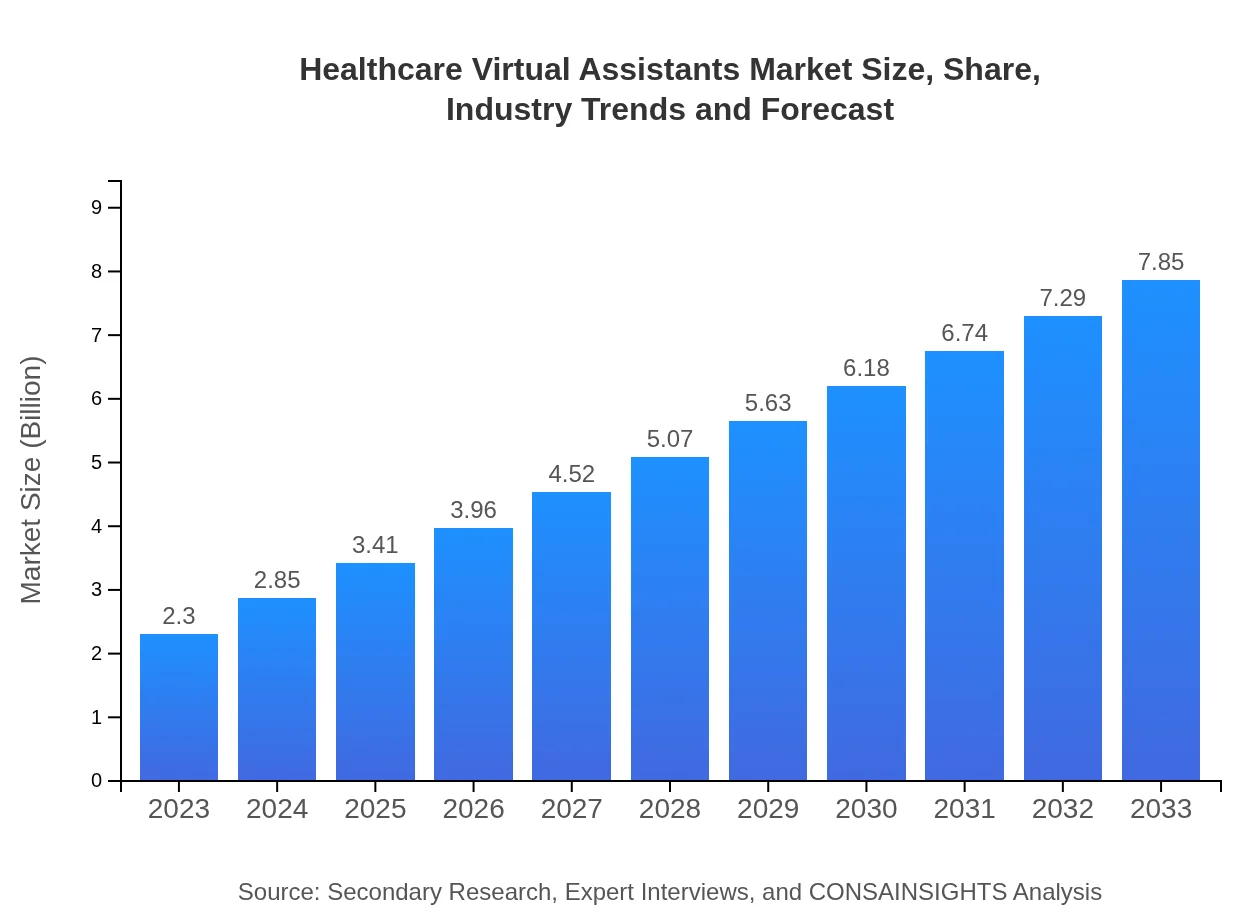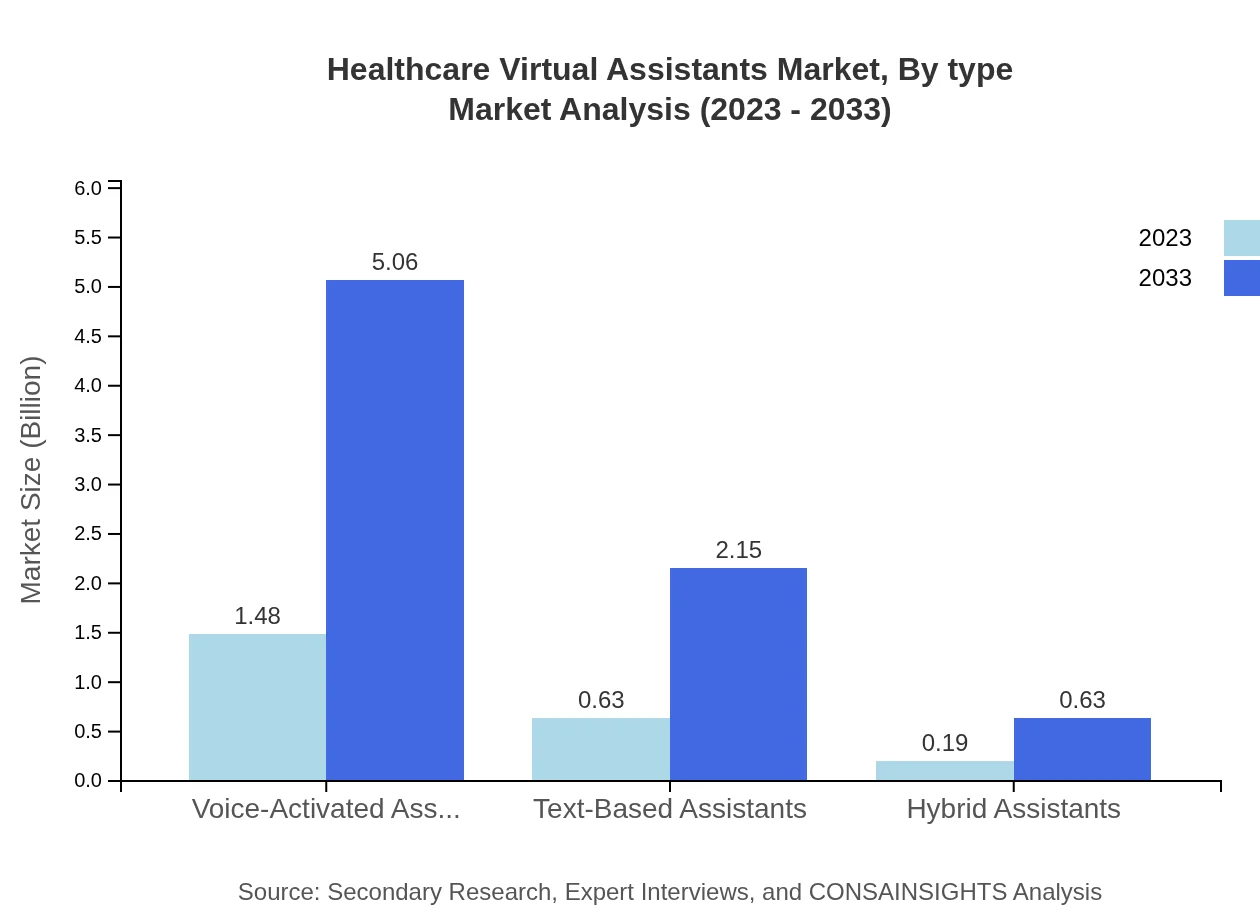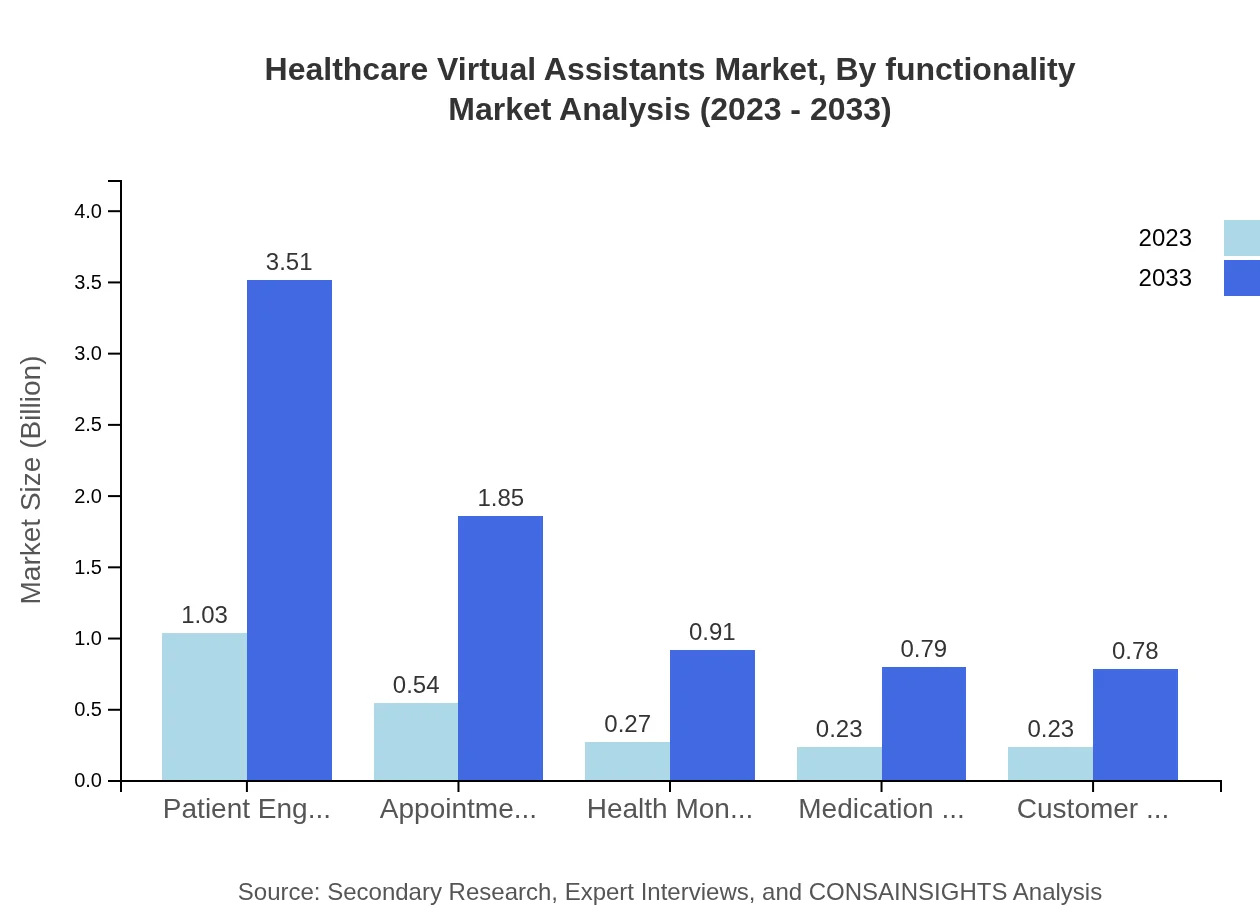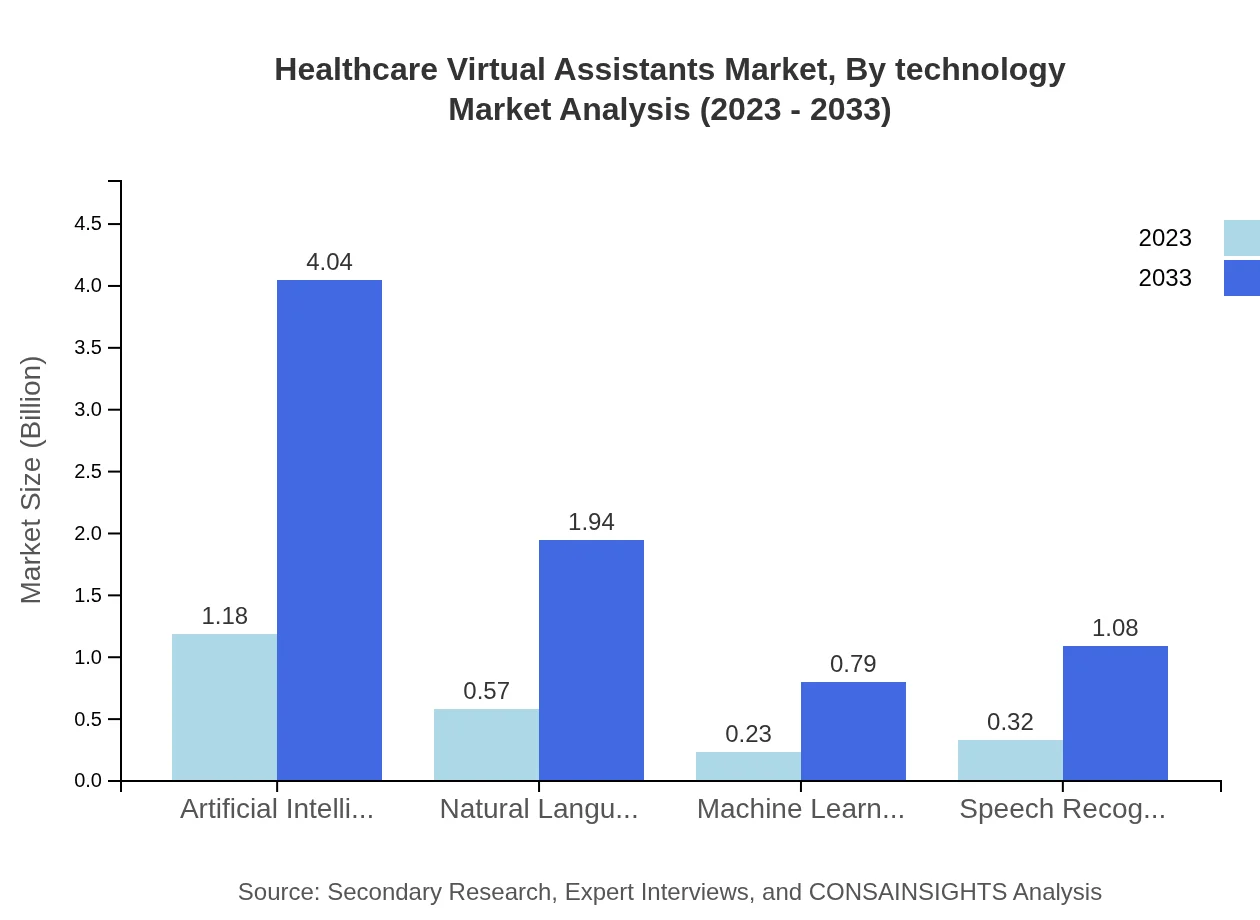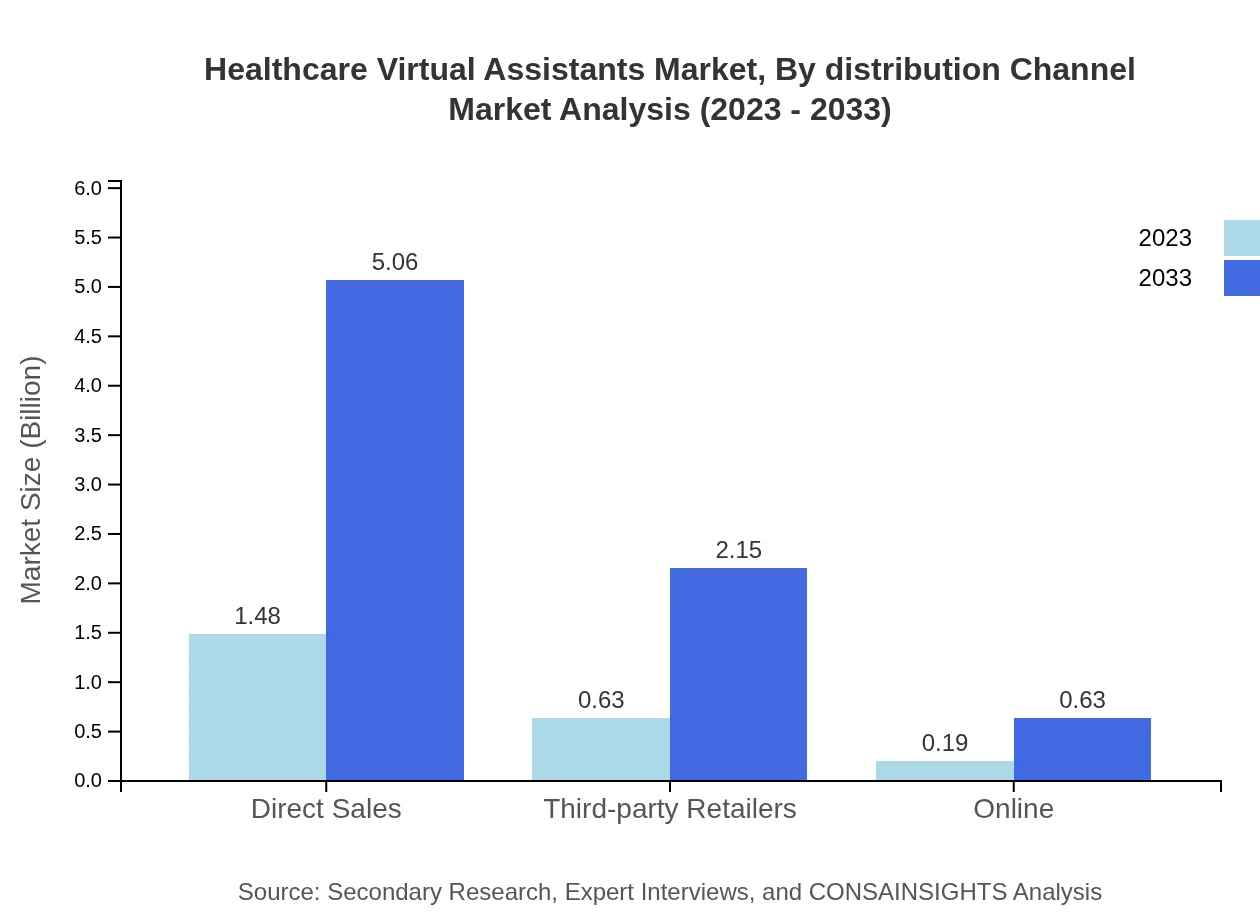Healthcare Virtual Assistants Market Report
Published Date: 31 January 2026 | Report Code: healthcare-virtual-assistants
Healthcare Virtual Assistants Market Size, Share, Industry Trends and Forecast to 2033
This report provides an in-depth analysis of the Healthcare Virtual Assistants market from 2023 to 2033, highlighting market dynamics, size, trends, key players, and region-specific insights essential for stakeholders in the healthcare industry.
| Metric | Value |
|---|---|
| Study Period | 2023 - 2033 |
| 2023 Market Size | $2.30 Billion |
| CAGR (2023-2033) | 12.5% |
| 2033 Market Size | $7.85 Billion |
| Top Companies | IBM Watson Health, Google Health, Amazon Alexa for Health, Nuance Communications, Cerebra Health |
| Last Modified Date | 31 January 2026 |
Healthcare Virtual Assistants Market Overview
Customize Healthcare Virtual Assistants Market Report market research report
- ✔ Get in-depth analysis of Healthcare Virtual Assistants market size, growth, and forecasts.
- ✔ Understand Healthcare Virtual Assistants's regional dynamics and industry-specific trends.
- ✔ Identify potential applications, end-user demand, and growth segments in Healthcare Virtual Assistants
What is the Market Size & CAGR of Healthcare Virtual Assistants market in 2023?
Healthcare Virtual Assistants Industry Analysis
Healthcare Virtual Assistants Market Segmentation and Scope
Tell us your focus area and get a customized research report.
Healthcare Virtual Assistants Market Analysis Report by Region
Europe Healthcare Virtual Assistants Market Report:
Europe's market for Healthcare Virtual Assistants is set to grow from $0.80 billion in 2023 to $2.73 billion by 2033. Key factors include stringent health regulations supporting digital health solutions and a growing emphasis on patient-centered care.Asia Pacific Healthcare Virtual Assistants Market Report:
In the Asia Pacific region, the Healthcare Virtual Assistants market is projected to grow from $0.40 billion in 2023 to $1.38 billion by 2033, driven by increasing internet penetration and smartphone usage among the population, along with rising healthcare investments.North America Healthcare Virtual Assistants Market Report:
North America leads the market, with an estimated value of $0.80 billion in 2023 growing to $2.75 billion by 2033. The presence of major technology firms and high healthcare expenditure are key factors driving this growth in the region.South America Healthcare Virtual Assistants Market Report:
The market in South America is expected to increase from $0.07 billion in 2023 to $0.23 billion by 2033. This growth is supported by an expanding healthcare infrastructure and an emphasis on digital health solutions.Middle East & Africa Healthcare Virtual Assistants Market Report:
In the Middle East and Africa, the market is expected to rise from $0.22 billion in 2023 to $0.77 billion by 2033. Investments in healthcare technology are increasing, driven by the need for improved healthcare services and patient engagement.Tell us your focus area and get a customized research report.
Healthcare Virtual Assistants Market Analysis By Type
The Healthcare Virtual Assistants Market, segmented by type, consists of Voice-Activated Assistants ($1.48 billion in 2023, projected to $5.06 billion in 2033), Text-Based Assistants ($0.63 billion in 2023, projected to $2.15 billion), and Hybrid Assistants ($0.19 billion in 2023, projected to $0.63 billion). Voice-Activated Assistants dominate the market share due to their convenience and growing consumer acceptance.
Healthcare Virtual Assistants Market Analysis By Functionality
Market functionality includes Patient Engagement ($1.03 billion in 2023, expected to rise to $3.51 billion), Appointment Scheduling ($0.54 billion, projected to $1.85 billion), Health Monitoring ($0.27 billion, projected to $0.91 billion), and Medication Reminders ($0.23 billion, projected to $0.79 billion). Patient Engagement holds the highest market share due to its critical role in improving patient outcomes.
Healthcare Virtual Assistants Market Analysis By Technology
This segment encompasses various technologies such as Artificial Intelligence (AI) ($1.18 billion in 2023 to $4.04 billion by 2033), Natural Language Processing (NLP) ($0.57 billion to $1.94 billion), Machine Learning ($0.23 billion to $0.79 billion), and Speech Recognition ($0.32 billion to $1.08 billion). AI remains the forefront technology enhancing capabilities and performance in virtual assistants.
Healthcare Virtual Assistants Market Analysis By Distribution Channel
Distribution channels for Healthcare Virtual Assistants are segmented into Direct Sales ($1.48 billion in 2023, expected to reach $5.06 billion), Third-party Retailers ($0.63 billion, projected at $2.15 billion), and Online sales ($0.19 billion, growing to $0.63 billion). Direct Sales holds the largest market share owing to established relationships between vendors and healthcare providers.
Healthcare Virtual Assistants Market Trends and Future Forecast
Tell us your focus area and get a customized research report.
Global Market Leaders and Top Companies in Healthcare Virtual Assistants Industry
IBM Watson Health:
IBM Watson Health specializes in developing AI-powered healthcare solutions, including virtual assistants designed to improve patient interactions and provide data-driven insights.Google Health:
Google Health leverages its technology to enhance virtual healthcare, offering sophisticated AI solutions that assist in patient management and real-time health information delivery.Amazon Alexa for Health:
Amazon has expanded its Alexa platform to health applications, allowing for appointment scheduling, medication reminders, and personalized health advice through voice commands.Nuance Communications:
Nuance provides AI-driven virtual assistants tailored for healthcare, focusing on improving clinical workflows and enhancing patient care through advanced speech recognition technology.Cerebra Health:
Cerebra Health develops innovative solutions integrating AI and machine learning to streamline healthcare communication and patient support processes.We're grateful to work with incredible clients.









FAQs
What is the market size of healthcare Virtual Assistants?
The global healthcare virtual assistants market is valued at approximately $2.3 billion in 2023 and is projected to grow at a CAGR of 12.5%, showcasing substantial growth potential throughout the forecast period.
What are the key market players or companies in this healthcare Virtual Assistants industry?
Key players in the healthcare virtual assistants market include major technology companies, healthcare software providers, and specialized AI developers that are innovating and bringing new solutions to the market.
What are the primary factors driving the growth in the healthcare Virtual Assistants industry?
Growth is driven by increasing demand for healthcare services, advancements in AI and NLP technologies, and the need for enhanced patient engagement and operational efficiency in healthcare settings.
Which region is the fastest Growing in the healthcare Virtual Assistants?
North America leads the fastest-growing region with a market size projected to rise from $0.80 billion in 2023 to $2.75 billion by 2033, driven by high healthcare technology adoption.
Does ConsaInsights provide customized market report data for the healthcare Virtual Assistants industry?
Yes, ConsaInsights offers customized market report data tailored to specific client needs, providing insights that cater to unique research objectives within the healthcare virtual assistants market.
What deliverables can I expect from this healthcare Virtual Assistants market research project?
Deliverables typically include comprehensive market analysis reports, regional and segment evaluations, growth forecasts, competitive landscape overviews, and strategic recommendations for stakeholders.
What are the market trends of healthcare Virtual Assistants?
Key trends include increasing utilization of voice-activated assistants, growth in patient engagement solutions, the rise of AI and machine learning applications, and enhanced healthcare service personalization.

